Beyond biology: Purdue HHS alumni doctors choose a well-rounded path to medicine
Written By: Rebecca Hoffa, rhoffa@purdue.edu
I think the College of Health and Human Sciences is really special because our classes contextualize the basic science courses that all pre-meds take. It helped me synthesize biochem and physics into modern applications in healthcare.
Natalie Lamport
HHS alumna, health sciences pre-professional program
The road to medical school is paved with hard work and a passion for helping people, but biology and standard science tracks are not the only way to get there. Among its 22 majors, ranging from psychological sciences to kinesiology, the Purdue University College of Health and Human Sciences (HHS) cultivates multitalented future doctors who are prepared for the rigor of medical school. Whether they are seasoned physicians or medical students deciding on a specialty, alumni often credit their experiences in Purdue HHS as an important part of their journey.
“I literally can’t imagine having done undergrad anywhere else — just the pride you feel for your school and how involved you feel, it’s incredible,” said Natalie Lamport, Purdue HHS alumna and third-year medical student at Wayne State University.
Doctors in training
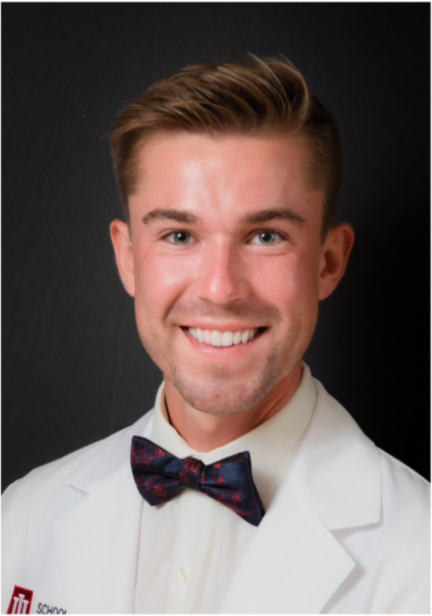
Lucas Turner, Purdue Health Sciences alumnus.Photo provided
Coming from a small Indiana high school, School of Health Sciences (HSCI) alumnus Lucas Turner was interested in medicine but wasn’t sure he had what it took to be a doctor until he entered the health sciences pre-professional program. His experiences at Purdue proved he was up to the task.
Now, entering his second year at the Indiana University School of Medicine-Evansville, Turner is glad he made the decision he did because HSCI prepared him with classes that put him ahead of his peers in the medical school curriculum.
“I decided on the health sciences pre-professional major because I thought it gave me the best all-around variety of classes without just focusing on biology or just focusing on chemistry,” Turner said. “I remember that I took an oncology elective, and some of my medical school classmates hadn’t even seen oncology before, so I felt lucky to have taken that class.”
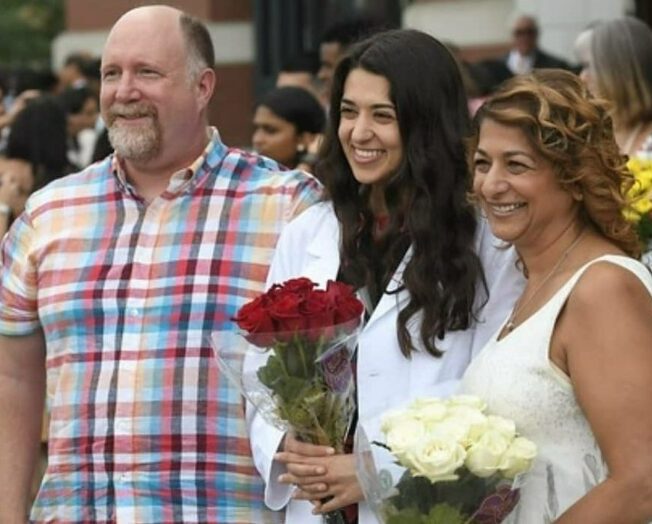
Natalie Lamport (center), Purdue Health Sciences alumna.Photo provided
Several hours northeast of Turner at Wayne State School of Medicine in Detroit, Natalie Lamport is considering pursuing a specialty in psychiatry or internal medicine, with a focus on health disparities. Her interest started at Purdue while participating in community outreach with the PATH street team, helping homeless populations. Having also majored in the health sciences pre-professional program, she reflects on the many HHS research and outreach experiences that influenced her success.
“I think the College of Health and Human Sciences is really special because our classes contextualize the basic science courses that all pre-meds take,” Lamport said. “It helped me synthesize biochem and physics into modern applications in healthcare.”
Department of Health and Kinesiology (HK) alumnus Gregory Latta is reaching the end of his time in medical school at the University of California, Riverside, where he is pursuing orthopedic surgery.
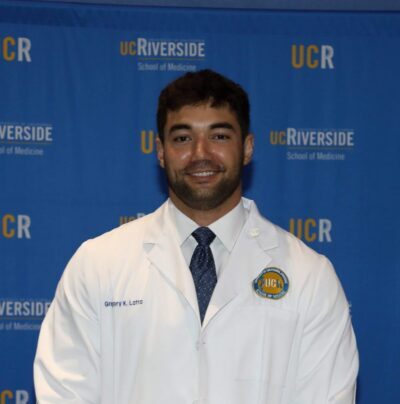
Gregory Latta, Purdue Health and Kinesiology alumnus.Photo provided
Latta originally chose an applied exercise and health major because he was interested in being a strength and conditioning coach; however, he later decided to become a doctor after getting injured more as a football player, where he played for Purdue and trained with the Denver Broncos. While he credits spending time with the sports medicine doctors as his reason for pursuing medicine, he noted that his kinesiology-focused major allowed him to really stand out to medical schools.
“I think the best thing you can do is to find something that differentiates you from other people,” Latta said. “Even if you think it’s minor, if you enjoy it and can talk about the passion of it, it doesn’t always have to be the same. Everybody tries to sell themselves really hard, but you don’t necessarily have to do that.”
Putting skills into practice
Becoming a doctor is a significant time commitment both in medical school and beyond. After four years of medical school, doctors must complete a residency program that lasts approximately three years and sometimes a specialized fellowship after that. While many HHS alumni doctors sacrifice their time and sleep, their reward often comes from helping people.
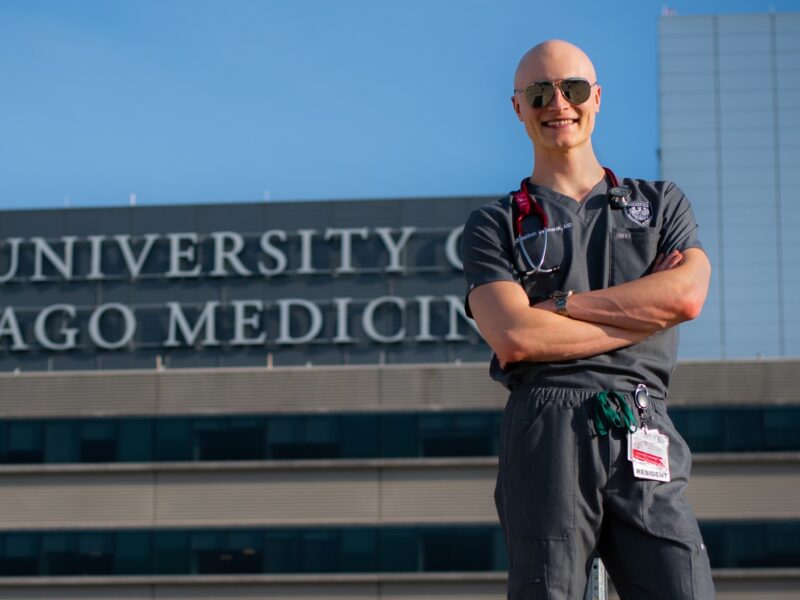
Jonathan Oskvarek, Purdue Psychological Sciences alumnus.Photo provided
Jonathan Oskvarek just finished his residency in emergency medicine at UChicago Medicine and is getting ready to begin his busy career as an innovation fellow at US Acute Care Solutions; an ER doctor at a community hospital in the Cleveland suburbs; and a clinical instructor of emergency medicine at Summa Health in Akron, Ohio.
At Purdue, Oskvarek majored in psychological sciences to round out his knowledge with social sciences that enable him to relate to his patients. Ultimately, helping his patients is what Oskvarek enjoys most about being a doctor.
“When you can meet someone in just a couple of minutes, and they’re in distress and feeling miserable, and it’s potentially the worst day of their life, and then you can fix them or at least make them feel better, that’s a pretty awesome feeling to know you made a major difference in that person’s life,” Oskvarek said. “For me, it’s kind of an everyday thing — it’s just my job. But for them, they’re probably going to remember that for the rest of their lives.”
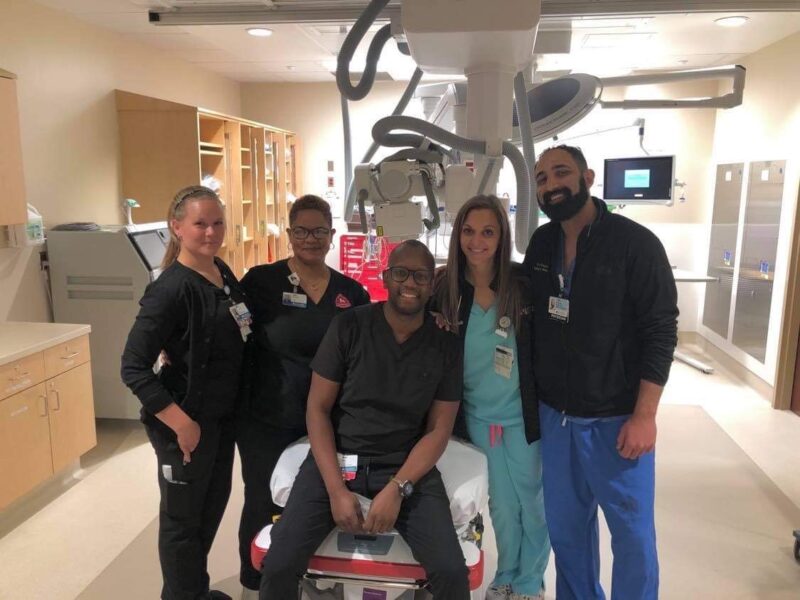
Kelsey Quin (second from right), Purdue Health Sciences alumna. Photo provided
HSCI alumna Kelsey Quin is also specializing in emergency medicine and entering into her second year of her residency at Grandview Medical Center in Dayton, Ohio. She said the health sciences pre-professional program allowed her to carve her own niche to add three minors and participate in a study abroad program, a medical mission trip and various leadership opportunities on campus.
“It’s more important than just sticking out on your application,” Quin said. “It’s important because when you’re well-rounded, you’re able to connect with different experiences and more diverse groups, and that’s so important in the emergency department where you only have 30 seconds to establish rapport with someone or their family — and sometimes even less.”
Akshay Thomas, a physician at Tennessee Retina and a HSCI alumnus, began his undergraduate career in India, where he initially planned to pursue a zoology track. Then, after hearing about Purdue from his sister, who also attended the University, he transferred to Purdue to pursue the health sciences pre-professional major that he noted went above and beyond the prerequisites he needed for medical school.
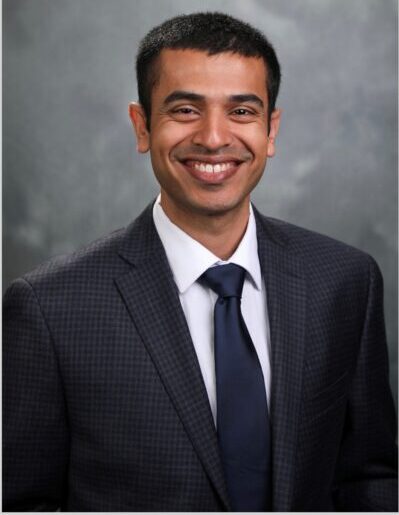
Akshay Thomas, Purdue Health Sciences alumnus.Photo provided
Coming from a family of teachers and scientists, Thomas created his own path in medicine. He knew he had an interest in surgery, but it was an outreach trip in India with the goal of performing eye surgeries in underserved populations that led him to ophthalmology and retina surgeries.
Similar to deciding on an undergraduate program, Thomas said the opportunities available and the culture make a world of difference in making a medical school decision.
“Wherever you go for medical school, just going to a specific school guarantees you nothing,” Thomas said. “It’s really what you do while you’re there that’s important.”
‘Remember what you’re in it for’
One consensus among Purdue HHS alumni doctors is their advice to undergraduate students: Become a well-rounded individual to stand out in the process and better serve patients.
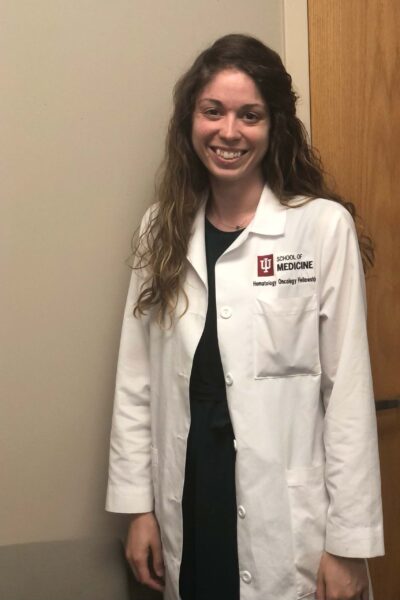
Jennifer King, Purdue Health and Kinesiology alumna. Photo provided
IU School of Medicine oncology fellow Jennifer King always knew she wanted to be a doctor. She noted that the Department of Health and Kinesiology offered a great way for her to round out her college experience by combining her interest in exercise science with her desire to become a doctor. She said HK allowed her to gain well-rounded experience while pursuing her passion.
“I feel like medical schools recently put a really big emphasis on being well-rounded,” King said. “It’s not so much about taking all of the science courses that you can because you’re going to be taking those courses once you reach medical school anyway.”
No matter what major students choose, Kelsey Quin noted that the journey to medical school isn’t easy, but the support she received from Purdue HHS’ faculty and staff helped her feel confident in her abilities toward successfully becoming a doctor.
“Just remember what you’re in it for,” Quin said. “A lot of times you get bogged down in all the details and the tests and everything else going on, and so you just really have to focus and remember why you’re going through this.”
Discover more from News | College of Health and Human Sciences
Subscribe to get the latest posts sent to your email.